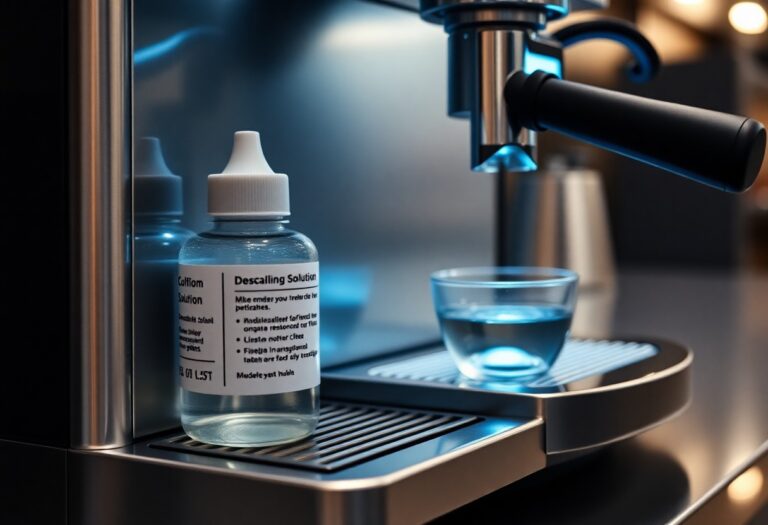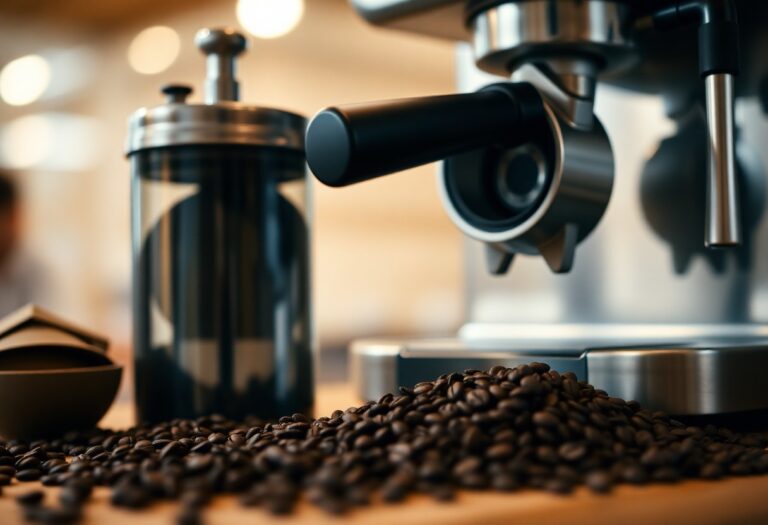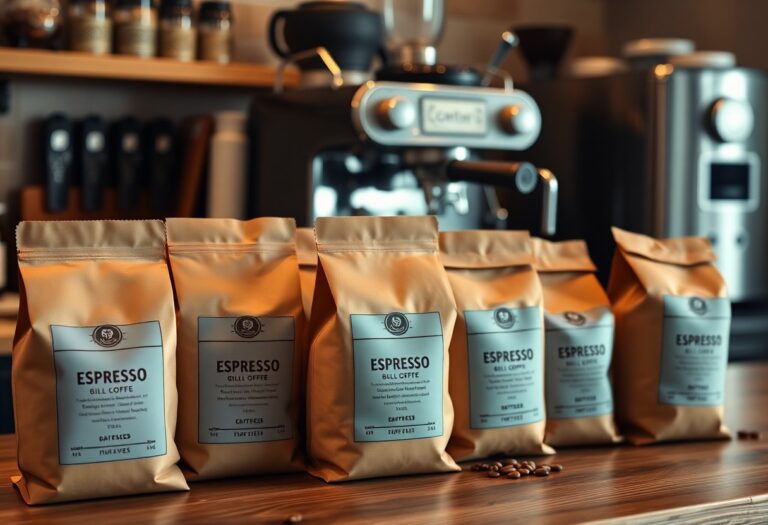What is a Commercial Coffee Machine – Business Equipment
Equipment like a commercial coffee machine is vital for your business if you aim to satisfy the cravings of coffee-loving customers. These machines are designed for high-volume use, offering speed, quality, and consistency that can enhance your café or restaurant’s reputation. By investing in a reliable unit, you not only streamline your operations but also provide delicious brews that keep patrons coming back for more. Understanding the advantages and types available will help you make a well-informed decision for your business needs.

Key Takeaways:
- Commercial coffee machines are designed specifically for high-volume use, making them ideal for cafes, restaurants, and offices.
- These machines come in various types, including espresso machines, drip coffee makers, and single-serve systems, catering to different brewing needs.
- They often feature advanced technology, allowing for precise temperature control and customizable brewing options to enhance flavor quality.
- Investing in a reliable commercial coffee machine can improve productivity and customer satisfaction, contributing to a better overall business experience.
- Regular maintenance and cleaning of commercial coffee machines are imperative to ensure consistent performance and longevity of the equipment.
The Core Mechanics: How Commercial Coffee Machines Operate
Understanding the mechanics behind commercial coffee machines enables you to appreciate their efficiency and reliability. These machines are engineered for durability and speed, ensuring a constant flow of high-quality coffee. They comprise several systems that work harmoniously, including heating elements, pumping systems, and control mechanisms, all designed to meet the demands of a busy café or restaurant. The precision in temperature control and water pressure plays a pivotal role in extracting flavors to produce consistent brews, allowing you to serve your customers with confidence.
Key Components and Their Functions
Each component within a commercial coffee machine serves a distinct purpose that contributes to the brewing process. The boiler maintains water temperature for optimal extraction, while the pump delivers water at the necessary pressure to extract flavors from the coffee grounds. The group head is where the magic happens, as it distributes hot water evenly through the coffee. Understanding these parts allows you to ensure proper maintenance and troubleshoot any issues that arise.
Brewing Methods and Technologies
Commercial coffee machines employ various brewing methods and technologies tailored to the preferences of your clientele. From traditional espresso machines to modern drip coffee makers and even single-serve units, these machines are equipped with various techniques to produce different styles of coffee. Espresso machines operate by forcing hot water through finely-ground coffee, creating a concentrated shot. In contrast, drip coffee makers rely on the slow passage of water through coarsely ground coffee to produce a larger volume of beverage.
Different brewing technologies enhance the quality and consistency of your coffee. For instance, super-automatic machines automate the entire process from grinding to brewing with the push of a button, ideal for high-demand environments. Alternatively, manual espresso machines allow skilled baristas to control every aspect of brewing, maximizing flavor extraction. Innovations like thermal brewing and pressure profiling further elevate the coffee-making experience, making it crucial for you to align the machine capabilities with your business’s coffee offerings and customer expectations.
The Financial Investment: Evaluating Cost vs. Value
Investing in a commercial coffee machine is not just about the sticker price; it’s about understanding the long-term value it can bring to your business. While the initial outlay may seem daunting, especially with high-end models, the potential for increased sales and customer loyalty can make this investment worthwhile. You’ll want to analyze how quickly the machine can pay for itself through improved efficiency and enhanced product offerings, putting you in a strong position to evaluate the overall return on investment.
Initial Purchase vs. Long-term ROI
The cost of a commercial coffee machine varies widely, from a few thousand dollars to tens of thousands, depending on features and brand. Understanding the long-term ROI requires examining not just the purchase price, but also how the machine contributes to your revenue over time. A high-quality machine may have a larger upfront cost, but its reliability and efficiency often result in better profits, making it a sound investment in the long run.
Maintenance Expenses and Their Impact on Budget
Maintenance costs can significantly affect your overall budgeting for a commercial coffee machine. Regular servicing, repairs, and parts replacement can add up, impacting your profit margins. Budgeting for these expenses is imperative to ensure you don’t experience unexpected financial strain, which could otherwise detract from your business’s growth and profitability.
In general, maintenance expenses should be anticipated when calculating the total cost of ownership. For example, some machines may require annual servicing costing between $300 and $600, depending on usage levels and the complexity of the technology. Additionally, regular descaling and cleaning products need to be factored in, which can run you approximately $100-$200 annually. It’s wise to factor in these ongoing costs alongside the purchase price to get a clearer picture of your long-term financial commitment and forecast cash flow accordingly. Ultimately, investing in a reliable machine paired with good maintenance practices can save you from larger repair costs down the track, ensuring smoother operations and happier customers.
Selecting the Right Machine: Factors to Consider for Your Business
Choosing the appropriate commercial coffee machine involves several critical factors tailored to your business needs. Start by analyzing your volume requirements to accommodate customer traffic, then consider the space available in your establishment. Additional features such as ease of use, maintenance demands, and customization options play a significant role in enhancing customer experience and operational efficiency. The decision should align with your brand identity and the preferences of your clientele.
Understanding Capacity Needs for Different Settings
Capacity requirements differ vastly between bustling cafes and small office settings. For high-turnover environments, machines capable of producing 200-300 cups per hour are ideal, whereas smaller operations may suffice with machines that brew 50-100 cups. Recognizing customer patterns and peak times helps you determine the capacity needed to meet demand without compromising quality.
Evaluating Features Based on Target Market
Your target market heavily influences the features you prioritize in a commercial coffee machine. If your clientele consists of coffee enthusiasts, investing in a machine with advanced brewing capabilities, such as temperature control and multiple extraction methods, can set your offerings apart. In family-friendly settings, simplicity and speed may be more important, lending focus to machines with user-friendly interfaces and quick brew times. Catering to the specific expectations of your audience can enhance customer satisfaction and foster loyalty.
When evaluating features, consider how they align with customer preferences in your location. For example, if your target market leans towards specialty coffees, models featuring integrated grinders or espresso functions position you to serve high-quality beverages efficiently. Alternatively, a straightforward brewing system with fully automated functions may be ideal for settings with less coffee expertise but a high demand for speed. Understanding these nuances not only helps you select the appropriate equipment but also empowers you to create an exceptional coffee experience that resonates with your customers.
The Branding Opportunity: Elevating Customer Experience
Elevating your customer experience through a commercial coffee machine offers a unique branding opportunity that can distinguish your business from the competition. A well-crafted coffee experience not only tantalizes taste buds but also reinforces your brand identity, making your café or restaurant a preferred destination. Customers appreciate quality and craftsmanship, which can translate to deeper loyalty and word-of-mouth promotion. By enhancing your coffee offerings, you’re not just serving beverages; you’re crafting memorable moments that keep customers coming back.
Coffee Quality and Customer Perception
The quality of your coffee directly influences how customers perceive your brand. When you serve high-quality, expertly crafted coffee, it reflects positively on your commitment to excellence. Studies show that 60% of customers would choose a dining establishment based on coffee alone. Your commercial coffee machine enhances this perception by consistently delivering delicious, aromatic brews that elevate the overall dining experience.
Designing a Unique Beverage Menu
A unique beverage menu allows you to showcase creativity while catering to a diverse clientele. Incorporating seasonal specialties, signature blends, and customizations not only sets your brand apart but also encourages customers to explore. For example, offering limited-time flavors can create a sense of urgency and excitement, prompting repeat visits. Additionally, highlighting local or ethically sourced ingredients reinforces your brand values and connection to the community. By curating distinctive beverage options, you turn routine coffee breaks into memorable experiences that resonate with your audience.
Consider adding signature drinks that reflect your brand’s personality, such as a specialty latte inspired by local flavors or a unique seasonal iced coffee that changes with the time of year. Crafting a catchy name or story behind each drink can also enhance its appeal. Offering non-coffee options, like teas or smoothies, and personalization choices, such as alternative milks or flavor add-ins, ensures that there’s something for everyone. This thoughtful addition creates a dynamic menu that keeps customers engaged and excited to discover what’s next.

Trends Shaping the Future of Commercial Coffee Machines
As the coffee industry evolves, so do commercial coffee machines, driven by emerging trends that cater to consumer preferences and operational efficiency. The future holds exciting developments, including enhanced connectivity, flavor customization, and equipment that can adapt to various brewing styles. These innovations not only improve customer satisfaction but also streamline operations in your business. Staying ahead of these trends will ensure your offerings remain modern and competitive.
Advancements in Technology and Automation
Automation and advanced technology are redefining how commercial coffee machines operate. Features such as touchscreen interfaces, smart brewing technology, and Wi-Fi connectivity allow for precise customization and remote monitoring. You can now manage machine settings and track usage patterns, optimizing efficiency and reducing waste. These advancements support consistent quality, ensuring that each cup meets your high standards.
Sustainability and Eco-conscious Innovations
Today’s coffee machines are increasingly designed with sustainability in mind. Innovations focus on energy efficiency, waste reduction, and eco-friendly materials, making it easier for you to align your business with environmentally responsible practices. These green technologies are not only beneficial for the planet but can also enhance your brand image and appeal to eco-conscious consumers.
Specific innovations include machines that optimize brewing temperature and pressure to reduce energy consumption while still delivering exceptional flavor. Some models incorporate recyclable components, and others utilize energy-saving features like programmable shutoff timers. By investing in these sustainable coffee solutions, you can actively reduce your carbon footprint. Additionally, customers are more likely to engage with your brand when they see a commitment to sustainability, ultimately fostering loyalty and positive brand associations.
Conclusion
From above, you can see that a commercial coffee machine is an necessary piece of equipment for any coffee-focused business, ensuring efficient operations and high-quality brews for your customers. Choosing the right machine allows you to meet your customers’ preferences and keep your business thriving. For more in-depth information, consider exploring The Complete Guide to Commercial Coffee Machine, which will further assist you in making an informed decision tailored to your specific needs.
FAQ
Q: What is a commercial coffee machine?
A: A commercial coffee machine is a high-capacity brewing device designed for use in commercial settings such as cafes, restaurants, offices, and coffee shops. These machines are built to produce large quantities of coffee quickly and efficiently while maintaining consistent quality. They often feature multiple brewing options, advanced technology, and robust construction to handle daily use in busy environments.
Q: What are the different types of commercial coffee machines available?
A: There are several types of commercial coffee machines, including espresso machines, drip coffee brewers, single-serve machines, and combined systems that offer both brewing methods. Espresso machines can be further classified into manual, semi-automatic, and fully automatic models. Each type serves different needs, from high-volume espresso production to traditional brewed coffee.
Q: How do I choose the right commercial coffee machine for my business?
A: Choosing the right commercial coffee machine depends on your business’s specific needs. Consider factors such as the volume of coffee you expect to sell, the types of beverages you want to offer, available space, and your budget. Evaluate the machine’s features, ease of use, maintenance requirements, and brand reputation. It’s also beneficial to consult with suppliers for demonstrations and recommendations tailored to your operations.
Q: What maintenance is required for a commercial coffee machine?
A: Maintenance for a commercial coffee machine typically includes regular cleaning, descaling to prevent mineral buildup, and checking all moving parts for wear and tear. Daily tasks might involve cleaning coffee spouts and drip trays, while weekly or monthly maintenance could include deep cleaning brewing components and replacing water filters. Adhering to the manufacturer’s maintenance guidelines helps ensure the longevity and optimal performance of the machine.
Q: Can a commercial coffee machine increase my business’s profitability?
A: Yes, a commercial coffee machine can enhance your business’s profitability by expanding your beverage offerings, attracting more customers, and improving overall customer satisfaction. High-quality coffee can differentiate your establishment from competitors and encourage repeat business. Additionally, providing popular options such as specialty drinks can help generate higher profit margins, particularly if paired with a well-designed menu and marketing strategy.







